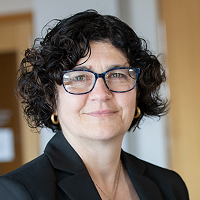Stefania Gallucci, MD
By Merin C. MacDonald | Date published: May 14, 2024
May Researcher Spotlight: Stefania Gallucci, MD
Department of Medicine immunologist aims to find new targets that help boost immunity and treat autoimmune diseases.
Stefania Gallucci, MD, professor of medicine in the Division of Innate Immunity and faculty in the Program in Innate Immunity studies the biology of what initiates the immune response and pathogenesis of autoimmune diseases such as systemic lupus erythematosus (SLE). With specialized training in molecular and cellular immunology and the biology of dendritic cells (DC) as stimulators of immunity, Dr. Gallucci’s research focuses on danger signals, which are molecules that activate DCs to kick-start our body’s immune response. Her lab is interested in DC recognition of danger signal molecules such as damage-associated molecular patterns (DAMPs) and microbial molecules such as pathogen-associated molecular patterns (PAMPs), as well as the role of bacterial infections and biofilms, and she studies their roles, respectively, in the initiation of innate immune responses and the pathogenesis of autoimmune diseases such as SLE. Her goal is to discover the molecules that trigger flares in SLE that can become new therapeutic targets to impact autoimmune diseases.
Dr. Gallucci is currently the principal investigator on two NIH National Institute of Allergy and Infectious Diseases (NIAID)-funded projects. In the first project, she and her team are establishing a mouse model of chronic/recurrent urinary tract infections in lupus-prone mice that SLE scientists can use to study the role of bacterial mucosal infections in the pathogenesis of autoimmune diseases. The goal is to test new therapeutic approaches through the control of subacute infections and the re-establishment of the urinary microbiome, which has important implications for women SLE patients where subclinical UTIs are associated with flares and the disease. In her second project, Dr. Gallucci and her collaborator Dr. Jessica Spinelli are exploring the innate immune response against bacterial biofilms through the characterization of the transcriptional and metabolic changes occurring in dendritic cells (DC) upon recognition of bacterial amyloids. She hopes to reveal new metabolic pathways as novel therapeutic candidates, starting with the purine pathway, an understudied pathway in DC biology, to strengthen innate responses against biofilm-driven infections. To accomplish these goals, the synergy between Dr. Gallucci, an innate immunity expert, and Dr. Spinelli, a mitochondrial metabolism expert, is vital, and a great example of the interdisciplinary collaborations that flourish at UMass Chan.
Dr. Gallucci earned her medical degree and completed her residency in clinical pathology and laboratory medicine at the Catholic University of Sacred Heart School of Medicine in Rome, Italy. She completed her postdoctoral fellowship in the Laboratory of Cellular and Molecular Immunology at the NIH’s NIAID in Bethesda, Maryland. After being faculty at the University of Pennsylvania and then Temple University, Dr. Gallucci joined the faculty at UMass Chan Medical School in the summer of 2022.
We are thankful for Dr. Gallucci’s important contributions and collaborations that are lighting the way to new therapies for autoimmune diseases and other immuno-pathologies.

